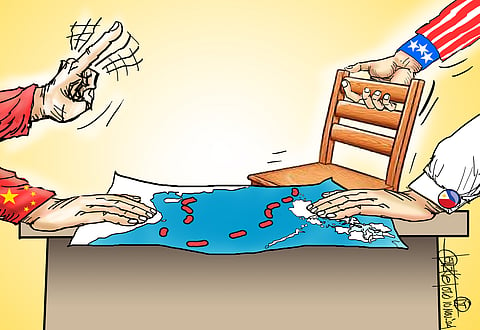
- NEWS
- the EDIT
- COMMENTARY
- BUSINESS
- LIFE
- SHOW
- ACTION
- GLOBAL GOALS
- SNAPS
- DYARYO TIRADA
- MORE

A caricature of a hand stirring a large body of water with a stick, presumably the West Philippine Sea, was how the acknowledged conduit of the Chinese Communist Party depicted the signing of the twin laws defining the maritime boundaries of the country.
The laws reasserted the Philippines’ entitlements primarily under the United Nations Convention on the Law of the Sea (UNCLOS) and the 2016 ruling of the Permanent Court of Arbitration.
The Philippine Maritime Zones Act and the Philippine Archipelagic Sea Lanes Act are significant laws to demarcate the country’s territory despite the disputes with other nations.
The Philippine Maritime Zones Act defines the country’s internal waters, archipelagic waters, territorial sea, contiguous zone, exclusive economic zone, and continental shelf in line with UNCLOS.
In essence, it provides the legal anchor for our fisherfolk to conduct their livelihood within the country’s waters and for local firms to harness the mineral and energy resources in our seabed.
The other law, the Philippine Archipelagic Sea Lanes Act, is complementary since it establishes a system of archipelagic sea lanes and air routes through which foreign vessels and aircraft can exercise their right of passage.
The Chinese mouthpiece termed the enactment of both laws as “detrimental measures that will also cause multiple harm to regional partners while resulting in a reduction in regional peace and tranquility.”
It then enumerated the effects of their passage, stating that the Philippines’ action seriously violated the requirement of international law for coastal states to respect the territorial sovereignty of other countries before asserting maritime jurisdiction.
“This flagrant infringement on China’s territorial sovereignty and maritime rights and interests in the South China Sea is a clear violation of China’s sovereign rights and maritime interests,” it indicated.
It cited Article 2 of the Maritime Zones Act as seeking to exploit international law to endorse its territorial expansion ambitions and illegal behaviors.
Article 8 of the Act was cited as audaciously claiming that “all artificial islands constructed within the exclusive economic zone of the Philippines shall belong to its government.”
It then mentioned Article 5 of the Declaration on the Conduct of Parties (DoC) in the South China Sea, which “emphasizes the importance of exercising self-restraint in the conduct of activities that would complicate or escalate disputes and affect peace and stability.”
The DoC is the non-binding agreement that temporarily substitutes for the Code of Conduct (CoC) which a foreign relations expert termed as “one of the diplomatic world’s longest gestations” since negotiations have been ongoing for what is being projected to be a binding agreement among West Philippine Sea claimants.
“Its would-be midwives have earned millions of air miles and generated many mountains of paper, but the baby has still not seen the light of day,” according to the expert.
It was on 21 July 1996 that a meeting of foreign ministers from the Association of Southeast Asian Nations (ASEAN) in Jakarta, Indonesia first endorsed the idea of concluding a regional CoC which would lay the foundation for long-term stability in the area and foster understanding among claimant countries.
The proposal was a response to China’s occupation of Mischief Reef, just 130 miles from the Philippine island of Palawan, a year and a half earlier. Singapore’s Senior Minister Lee Kuan Yew then compared China’s actions to “a big dog going up to a tree and raising its leg.”
China has kept the CoC negotiations stalled with its impossible demands such as the exclusion of third-party involvement and recognition of its historical nine-dash, now 10-dash, line claim over the South China Sea.
China’s megaphone rattled off other worn-out arguments that would be a waste of space to mention but the point that it wanted to make is that both Philippine laws “hold no binding effect on any other nation, including China.”
The enactment of both laws puts China on the defensive since it lays bare that the Philippines stays aligned with international conventions while it becomes plain that China’s historical claim has no leg to stand on.
